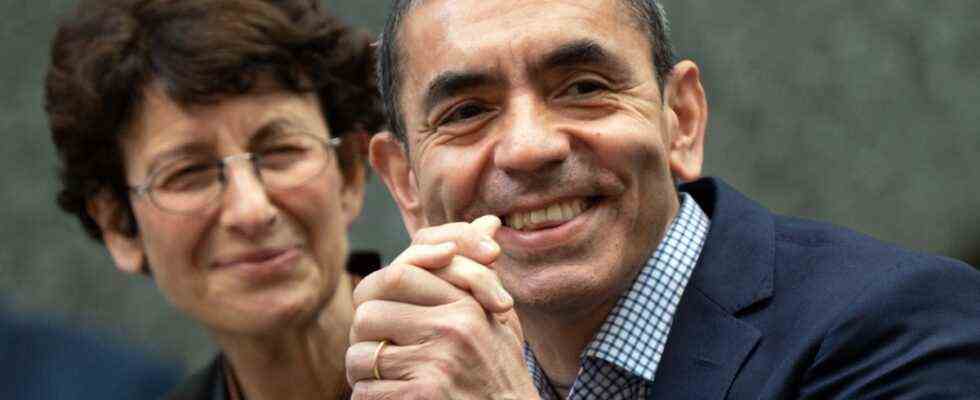The juries of the great science prizes have it easy and at the same time infinitely difficult this year. Because the choice of the topic for which they award their prizes is easy – or what else should researchers be honored for this year than for the development of mRNA vaccines, which as an innovative product make an immeasurable contribution to mastering the Covid-19 pandemic Afford? The only problem is: who exactly is going to receive the prizes?
The Paul Ehrlich Foundation has just decided in favor of the two doctors and Biontech founders Özlem Türeci, 54, and Uğur Şahin, 55, as well as the biochemist Katalin Karikó, 66, who also works for Biontech. You will receive the Paul Ehrlich and Ludwig Darmstaedter Prize 2022, as the Board of Trustees announced on Tuesday. “Thanks to their persistent basic research, their persistent development work and their determined and correct reaction to the emergence of Sars-CoV-2, they created a vaccine to combat the pandemic and introduced the scientific community and the global public to the enormous potential of the preventive and therapeutic use of mRNA in mind, “writes the foundation to justify it.
Katalin Karikó,
(Photo: imago stock / imago images / ZUMA Wire)
The prize, endowed with 120,000 euros, is one of the most important German science prizes, and many later Nobel Prize winners have received it. And that could prove to be the case again this time when the Nobel Prize winners are announced at the beginning of October. It can be assumed that the inventors of the mRNA vaccines will also be intensively thought about when the Nobel Prizes are awarded.
Should the Nobel Foundation and Nobel Committee also decide on the topic of mRNA, they could, in the end, honor other people. As much as the mRNA vaccines are considered to be particularly award-winning this year, it is just as difficult for the juries to choose who exactly will be considered. After all, as with many other inventions, a great many people have contributed to it – whether they have made their first discoveries, formulated ideas for the first time or transferred the results of basic research into clinical practice. Only the number of winners is limited for many awards. And for both the Paul Ehrlich Prize and the Nobel Prizes, there can be a maximum of three.
Hoerr was among the first to recognize the potential of mRNA.
From a German point of view, one person in particular went painfully empty-handed at the important Paul Ehrlich Prize: Ingmar Hoerr, 53, the co-founder of the Tübingen-based company Curevac, which in the race for the first mRNA vaccine against the Mainz company Biontech and the US Company Moderna has lost. To date, the vaccine from Tübingen has not received approval – its effectiveness has so far proven to be too low in practice. Ingmar Hoerr was one of the first to recognize the potential of mRNA for vaccination.
In the 1990s, Hoerr successfully smuggled RNA into the body cells of mice for the first time, thereby triggering an immune response. The RNA had led to the production of proteins in the cells, for which it provided the blueprint and actually activated the immune system of the mice. Exactly as it is now being used billions of times with the Covid vaccines: Here the mRNA provides the blueprint for the spiked protein of the coronavirus, so that the body positions its immune weapons against the virus in order to be prepared in the event of a possible infection.
In doing so, Hoerr had to show a great deal of perseverance, because at the beginning his results met with doubts, his plan was considered to be hardly feasible. At the time, it was said that RNA was too unstable and difficult to work with. Katalin Karikó, now honored with the Paul Ehrlich Prize, encountered similar resistance around the same time in the USA. The native Hungarian relied steadfastly on mRNA as a possible remedy. But the scientific world prefers to deal with its sister molecule, DNA. Karikó received hardly any research funding, she was even demoted by her employer, the University of Pennsylvania, in 1995 and lost her professorship. Nevertheless, she developed a particularly effective method for RNA preparation and in 2013 accepted the invitation from Uğur Şahin and Özlem Türeci to work at Biontech in addition to their position at the University of Pennsylvania.
Uğur Şahin and Özlem Türeci have also been working with mRNA for decades. They have been working on developing cancer vaccines with the help of this molecule since the mid-1990s and founded Biontech in 2008. When Sars-CoV-2 took hold of the world, they immediately set about using their technology against this virus.
So Şahin, Türeci and Karikó are undoubtedly deserved winners of the Paul Ehrlich and Ludwig Darmstaedter Prize 2022. Had there been four places on the podium, Hoerr might have been there. And it would also be easy to recognize a whole group of scientists who have worked with diligence and vision in this field and who will still miss out on the upcoming awards for mRNA vaccines.
Katalin Karikó also sees it that way. In June she wrote an email to Robert Malone, an American colleague who, at the end of the 1980s, first got cells to produce proteins, the instructions for which he provided them with mRNA, which he packed in fat globules. It was the first proof of the principle that the Biontech vaccine uses today: “I have sent many reporters to you, Ingmar (Hoerr), Ugur Sahin, Stephane Bancel (Moderna) and all the other scientists in this field “, she wrote, in view of the many praise and attention she is currently receiving, almost a little contrite.

